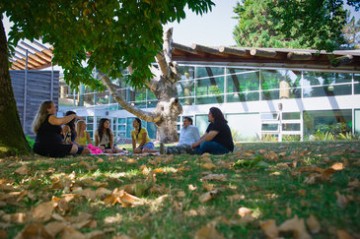The University engages Aboriginal people in mutually supportive and productive relationships, and works to integrate understandings of Indigenous cultures and histories into its curriculum and operations.
We are connected to this place …. We are the land, and the land is us.
Musqueam: A Living Culture
The promise of this place is made to us all. In respect of the Musqueam and Okanagan lands on which the University sits, and with all voices raised to tell a new story, UBC advances educational opportunities with and for Aboriginal people on its campuses and in the wider community.
In response to the expressed needs and aspirations of Aboriginal peoples, UBC engages in research and generates curricula across the University that respect, reflect, and include Aboriginal cultures, histories, and systems of knowledge. In both academics and operations, the University addresses issues of ignorance and misunderstanding resulting from the educational failures of the past.
The University strives to ensure that Aboriginal students, staff, and faculty find their perceptions and experiences echoed in the classroom, on campus, and among their peers.
The promise of this place is true in any language:
![]() (Musqueam)
(Musqueam)
![]() (Okanagan)
(Okanagan)
Welcome.
Action
- Expand curriculum offerings focusing on Aboriginal issues and perspectives
- Expand the professional development available to administrators, faculty, staff, and students in working productively with Aboriginal colleagues and discussing Aboriginal issues
- Increase hiring of highly qualified Aboriginal faculty and staff
- Strengthen programs supporting the entry, academic success, social support and wellbeing of Aboriginal students
- Create and support programs that help prepare Aboriginal students for post-secondary education
Outcome
- An interactive learning exhibition on the Berger inquiry engaged more than 400 UBC students from diverse faculties and secondary school students in conversations surrounding the Mackenzie Valley Pipeline and the struggle for Aboriginal rights in Canada
- The Centre for Teaching and Learning conducts training for new administrators, teaching assistants, and faculty in addressing Aboriginal issues and conducting effective classroom discussions; significant Aboriginal content included in Administrative Leadership Development Program
- Persistent attention to opportunities to hire Aboriginal faculty and staff across the university has been effective (47 active academic faculty and staff identify as Aboriginal), though hiring in specific areas often involves multi-year recruitment
- Programs such as the Emerging Aboriginal Scholars, Summer Science, CEDAR, and the Native Youth Program introduce Aboriginal students to campus, faculty, and university study
- The Okanagan Faculty of Education has partnered with the En’Owkin Centre to develop a Developmental Standard Teaching Certificate with courses in the Okanagan Language and Culture prior to completing Education courses
Action
- Develop critical community partnerships centered on initiatives of high value and priority for Aboriginal communities
- Strengthen and expand research of benefit to Aboriginal communities developed with significant community collaboration
- Strengthen and expand student involvement in Aboriginal community-based research and service learning with Aboriginal organizations
- Create venues for dialogue with Aboriginal communities, and the broader public, on significant issues
- Provide faculty and staff with the means and professional development opportunities to effectively collaborate with Aboriginal individuals and communities
Outcome
- New initiatives such as the First Nations concentration in the School of Community and Regional Planning, co-developed with the Musqueam Indian Band, join established programs in First Nations Languages and other areas in addressing high priority concerns; the newly established Centre for Excellence in Indigenous Health is establishing a strong working relationship with communities and the recently established First Nations Health Authority
- A UBC Community-Based Research initiative is bringing attention to many collaboratively designed and implemented projects in Aboriginal research
- The First Nations Studies Program requires all majors to complete year-long research projects in collaboration with Aboriginal organizations meeting the organizations’ stated needs
- In September 2013, UBC suspended classes for the opening of the Truth and Reconciliation Commission’s National Event in Vancouver and many students attended the opening and many other events on campus.
- UBC is working to establish an Indian Residential School History and Dialogue Centre, affiliated with the TRC’s National Research Centre in Winnipeg, that would provide ongoing access to TRC records serve as a hub for communities, researchers, students, and the public to join in nderstanding this history and building a base for more productive dialogues. Greg Younging of UBC Okanagan served as Assistant Director of Research to the TRC.
- The professional development initiatives at the Centre for Teaching, Learning, and Technology, and the Community-Based Research initiative, both noted above, and many other department-level initiatives provide effective ways for faculty and staff to develop their capacity for engagement
